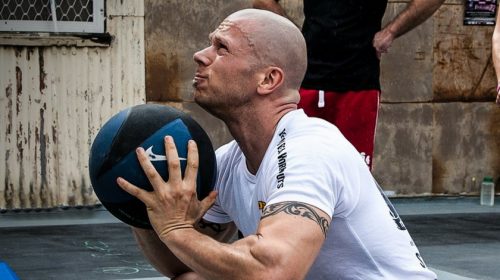“I mistrust all systematizers and I avoid them” ~ Friedrich Nietzsche
It’s long been assumed by most fitness enthusiasts that in order to train effectively, one must follow a “program.” But is this really true?
Now understand, I am a Certified Personal Trainer, and I make my living primarily by having clients follow one kind of program or another. So, yes, you can say I’m biased. Nevertheless, as in all things, we should not blindly move forward, but do so with our eyes wide open.
After all, as Socrates once said, “The unexamined life is not worth living.”
Seeing a need to have someone show us how to work a program means having the humility to admit we don’t really know how to do it on our own. There’s wisdom in that.
Yet ultimately, I believe what we should seek are principles more than programs. In fact, a good program is basically a collection of principles.
Principles are from God, and on a certain level, can be innately understood by human beings. They are the laws of the universe, such as gravity. When we follow natural laws, things go well for us, and when we don’t, well…
Programs are from man. They are formulated often from years of trial and error—man bumping his head until he (or she) finds something that works. One good thing about programs is that one doesn’t need to reinvent the wheel; much of the heartache has been worked out. This is where the idea of “hacks” comes from. Instead of spending potentially years figuring out how to do something, a “hack” is taught to demonstrate easy steps to a prescribed goal from someone who has already done the heavy lifting… uh, so to speak.
 Health and physical fitness are a crucial part of our lives. Most people don’t want to spend years figuring out how to get the most bang out of their diet or workout. They could literally be dead by then. Graphic, but nonetheless true.
Health and physical fitness are a crucial part of our lives. Most people don’t want to spend years figuring out how to get the most bang out of their diet or workout. They could literally be dead by then. Graphic, but nonetheless true.
In the world of health and fitness, virtually anything can be programmed…. a workout, a week’s worth of workouts, a month’s, twelve weeks, and onwards. Warm up exercises can also be programmed, as can work exercises, sets, repetitions, cardio, mobility work, etc. to enhance safety and to encourage specific results.
Want to get fast? Strong? Big? Small? Powerful? Mobile? You name it, there’s a program for it.
Just take exercise repetitions for example. One can program many “reps”, such as 13-20, to produce more endurance; 6-12 reps for muscle hypertrophy; and 1-5 for strength.
One can program a particular number of exercise sets to create a predictable outcome, or a certain type of set, such as a pyramid or drop set. One can program how much time a trainee should rest in between sets, or in between workouts, to create other effects.
For instance, bodybuilders are looking for maximum definition and separation between muscles, which means they want minimum body fat to make sure their attributes show; and they also want to do get more exercises into their workouts, to make sure they’re hitting their muscles from multiple angles. Therefore they tend to use short rest periods of from zero (if they are switching from one exercise to another, as in a superset) to 90 seconds.
 In contrast, a powerlifter’s goal is to simply get stronger in a few key lifts while staying in a particular weight class. He or she will do fewer exercises for fewer repetitions with longer rest periods, making sure they’re good and ready to lift as much weight as possible each set.
In contrast, a powerlifter’s goal is to simply get stronger in a few key lifts while staying in a particular weight class. He or she will do fewer exercises for fewer repetitions with longer rest periods, making sure they’re good and ready to lift as much weight as possible each set.
These are all decisions of programming.
Programming Pros and Cons
One downside to programming is that a program—much like a diet—has been pre-PROGRAMMED by another person for you. So programs can be regimented, stifling, and even boring.
But for those with little time and a hard goal, they can be very good. In the world of weight training alone, there are novice, intermediate, and advanced programs in a number of disciplines including: bodybuilding, Olympic lifting, powerlifting, kettlebells, and hybrids that combine features from all, including Crossfit-style programs, which emphasize interval training (endurance) and power.
So to program or not to program, that is the question.
For me, it comes down to a couple of things: 1. Are you enjoying the process? 2. Are you hitting your goals? (i.e.: building the amount of muscle you seek, cutting fat, taxing your central nervous system, etc.) If you answer “yes” to both questions, you’re doing well in my book. So it then comes down to preference.
I believe the vast majority of weightlifters, athletes, and fitness enthusiasts would say “yes,” a program is necessary. But not all.
Top fitness trainer and author Pavel Tsatsouline noted in his book, The Russian Kettlebell Challenge, that Trofim Lomakin, a world champion weightlifter from the 1950s, had an unusual training routine:
Lomakin would barely show up at the gym once or twice a week, mostly to check in with his boss. Then, three months before a USSR or a world championship, TL would kick up his training into high gear—and win. Lomakin remained world class for ten years, well into his thirties. “I have never met another athlete with such an animal instinct for the load,” recalls his teammate great Yuri Vlasov. “Lomakin was not interested in spread sheets and charts but picked ideal training loads without fail. He made fun of my calculations and of everyone who participated in my experiments…
I must admit I relate to Lomakin.
While training myself and my clients, I am partial to principles over programs. Yes, I create programs for clients, but they are based on solid principles that allow for creativity and experimentation within the structure. I’ve never enjoyed excessive regimentation, and I don’t teach that way.
Ultimately, my aim is to bring the trainee back to “the teacher within.” When the trainee no longer needs me, I have truly done my job. Now he or she has mastered the core principles that make up the ultimate “program.”
– – –
Patrick Rooney is the Founder and President of GREEK PHYSIQUE™, LLC, which specializes in functional body sculpting for men and women in Middle Tennessee and worldwide via phone and Skype. Patrick is Certified through the National Association of Fitness Certification (NAFC). Email questions or training inquiries to [email protected].






[…] Find out in my latest column at The Tennessee Star. […]